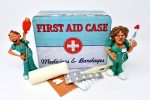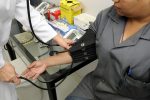
You could be one of the people interested in finding a job in the healthcare industry.
One of the easier positions to apply for is that of a patient care technician.
Nobody should find employment as anything without learning more about the job or occupation they choose.
This article will present you with 5 things you need to know before becoming a patient care technician.
Don’t stop reading!
Page Navigation
Patient Care Technicians Work Supervised
It’s quite normal not to know that the medical field has many different types of occupations.
This is especially true when it comes to those helping doctors take care of the sick.
There are registered nurses, medical assistants, patient care technicians, certified nurse assistants, and more.
Telling them apart is sometimes difficult.
One of the first things to know about patient care techs is that their work is always supervised by either doctors or nurses.
PCTs are responsible for completing tasks like these:
- Talking to the patients’ families
- Collecting blood or urine samples
- Taking the samples to the lab
- Helping the patients with their hygiene
- Feeding patients
- Performing CPR if needed
- Monitoring the vitals of the patients
- Escorting the patients to the various places for investigations
- Maintaining rooms clean
- Performing catheter care – where needed
Depending on the needs of each sick person and other available personnel in the facility, these tasks will be adjusted accordingly.
Patient Care Technicians Need Skills
By having a look at the list of tasks of a patient care technician it’s easy to understand that you’ll need some skills.
Here are some of the abilities you’ll need:
- Being detail-oriented
- Having physical stamina
- Having very good communication skills
- Being compassionate
- Being able to anticipate needs
- Being able to work in a team
All these skills will help you deal with many stressful situations.
Additionally, you’ll also be able to solve some problems either before they happen or without being told so, after they happened.
Compassion and good communication skills are useful when working with people from many walks of life.
Not everyone will have the same degree of patience when their loved ones are suffering.
The way the staff of the facility talks to these people can either improve or make things worse.
If you don’t think you have all these qualities, it might be better to consider another occupation.
Patient Care Technicians Need Knowledge
The list of duties also implies you’ll require specific knowledge.

Here’s some of the knowledge you’ll need for this occupation:
- Collecting blood or urine samples
- Taking the samples to the lab
- Performing EKGs
- Performing CPR if needed
- Performing catheter care
The majority of these procedures have a specific protocol that must be followed.
Only through training and/or education, you can learn the correct procedures you must perform.
Before you can sign up for any of the training programs available, you’ll have to ensure you have at least a GED if not a high school diploma.
Future students will also be required to:
- Pass a tuberculosis test
- Be fully vaccinated against:
- MMR
- Varicella
- Hepatitis B
- Flu
- Tetanus
- Have a clean criminal record
- Pass a drug screening
These are highly infectious diseases and you need to be protected against them.
The patients will also be protected from catching these, ensuring their recovery will go smooth.
Once these prerequisites are met, you’ll need to find a school.
Schools can be found in most US states.
These are usually colleges and training centers for adults.
Keep in mind that the majority of institutions offering training programs might have additional requirements.
These could be related to your performance in specific classes and asking for grades above “C” for them.
You’ll need to check with the school to find out in which subjects you need a minimum grade.
The classes can be attended both in-person and online.
Programs can last anywhere from a few months and rarely over 2 years.
We just mentioned you need specific marks in some subjects so you’re probably curious to find out what you’ll be studying.
Why don’t you have a look at this non-comprehensive list?
- Medical terms
- Patient care
- Reading vital signs
- Nutrition
- Patient charting 101
- Introduction to anatomy
- Patient cleanliness
- Compliance
- Safety
- Professional Responsibility
- Infection Control
- Phlebotomy
- EKG
Future patient care technicians need to participate in clinical practice hours as well during the program in which they enrolled.
It’s worth noting that the shorter programs don’t include such hours.
You might want to figure these classes on your own if you choose one of these programs.
Patient Care Technicians Need Certification
The question you might have is what’s the point of getting trained if you don’t get certified?
In fact, you’ll need certification to be allowed to work as a patient care technician, as we’ll explain later on.
The certification that will be the most useful is the one issued by the National Health Association.
The NHA gives certifications to those who pass the patient care technician or assistant (CPCT/A) examination.
Meeting a few prerequisites for the exam is no wonder.
One requirement is to finish either one of the following first:
- Graduate from a training program as explained earlier
- Accumulate 1 year of related experience
If you prefer the experience path, you can get hired as a certified nurse assistant.
To be allowed to take the test, you also need to pay the $149 exam fee.
Sometimes this charge is included in the training program you just completed.
This certification exam has a duration of 2 hours and a total of 120 questions to answer.
The results are ready in 2 days and the certificates in 2 weeks.
All PCTs must earn the CPR certificate as well.
You’ll want to earn additional credentials if you want to stand out from the competition.
These include:
- EKG
- Phlebotomy
You obtain these additional credentials by taking and passing extra exams.
Don’t ignore the specific courses you can take for these credentials either.
The Work Environment of a Patient Care Technician
One of the first things you should know about your future work employment is that you’ll be required to be registered with the state’s Nurse Registry.
To be accepted in the Registry, you’ll need the NHA certification about which we talked earlier.
You’ll be working in settings such as:
- Hospitals
- Clinics
- Long term patient care units
- Retiring homes
- Hospices
Your schedule will depend on these employers and will include evenings, nights, and weekends.
This is especially true for the facilities that operate 24/7.
In any case, working extra shifts compared to a traditional job means you’ll earn a higher salary.
For a higher salary, you can also accumulate more experience or earn a degree.
One of the best things about working in the healthcare industry is that there will always be a demand for personnel.
Finding a job in this field is easy for those with the correct credentials.
Conclusion
We hope that by now you have a clearer picture regarding the job of a patient care technician.
It’s pretty clear to see that the occupation is rather demanding both physically, mentally, and emotionally.
Not everyone is made for this kind of work, but if you think you can do it, you’ll enter a pretty satisfactory industry.
You’ll be able to help others not only get better but also feel better, since nobody wants to be ill.








